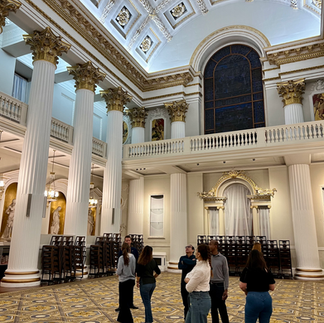As we enter the season of Lent, we're delighted to share a special devotional booklet that has been written from the heart of our community at St Katharine Cree. This six-week journey through creation reflects the vibrant spirit of our Spanish and Portuguese-speaking congregation, whose members have brought such richness to our historic Guild Church for Workers in the City of London. It has been produced by Kitty Montero Junca who coordinates our English classes and community outreach.

Inspired by Community, Rooted in Creation
This devotional takes us on a remarkable journey across six stunning natural locations in Latin America and Africa: from the biodiverse Madidi National Park in Bolivia to the towering palms of Colombia's Cocora Valley, from the unique wildlife of Ecuador's Galápagos Islands to the hidden beauty of Peru's Gocta Waterfall. Each week explores a different aspect of God's creation, inviting us to see His presence reflected in the natural world while drawing profound spiritual lessons for our Lenten journey.
A Celebration and a Challenge
The devotional is both a celebration of what God has already done in our midst and a challenge to see His presence more clearly in creation around us. It reminds us that we are called not just to admire God's handiwork, but to be caretakers of it. This ensures that future generations may also witness God's glory in the world He has made.

Grounded in St Francis of Assisi's beautiful Canticle of Creation, each week offers a reflection on themes like stewardship, rootedness in faith, unity in diversity, protecting the vulnerable, seeking truth, and embracing our unique roles in God's kingdom no matter how small they may seem.
For the Whole Journey
Whether you're part of our community at St Katharine Cree or joining us from afar, this devotional invites you to slow down during Lent and notice God's presence in the wonder of creation. Each week includes a reflection, a Bible verse, and a question to carry with you through the days ahead.
As we journey together from Ash Wednesday through Holy Week, may we see ourselves more clearly in the truth of God's light and the hope of His victory.













